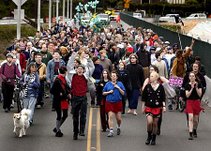[olympiaworkers] 100th Anniversary of Bread and Roses Strike— Was It the First Occupy?
by Adele Stan, Jan 12, 2012 AFL-CIO
Today in Lawrence, Mass., union members and their allies will gather at a
historic mill building for a re-enactment of the historic Bread and Roses
strike that moved the conscience of the nation, bringing national
attention to the plight of the families, including young children, who
toiled in the dirty and dangerous factories of Lawrence and throughout the
country.
The re-enactment kicks off a yearlong celebration of the Bread and Roses
centennial, which will commemorate change-making events in Lawrence that
gave rise to the U.S. labor movement.
On Jan. 12, 1912, some 25,000 workers at the mills of the American Woolen
Company in Lawrence walked off the job when the company cut their
pay—already a mere $8 a week for the men, and less for the women and
children—after the state legislature passed a law shortening the length of
their workweek from 56 hours to 54 hours. Workers stayed off the job for
months, enduring beatings from police and the Massachusetts militia, who
spared not even women and children.
Some see in the conditions that led to the Bread and Roses strike
parallels to today's growing income disparity between the wealthy and the
rest of us, as well as the exploitation of America's workers by financial
interests. Robert Forrant, a history professor at the University of
Massachusetts, calls it "the first Occupy movement." Says Massachusetts
AFL-CIO President Steven Tolman:
It's an unfortunate irony that we have come full circle since 1912.
The strikers then were immigrant workers barely able to survive on low
wages. Today Lawrence, like many industrial cities, is a place where
immigrant workers are really struggling in an unfair economy.
The strikers were mostly immigrants who had crossed the ocean on a promise
of prosperity, only to find themselves and their children brutally
exploited by the textile tycoons.
Ethan Snow, a member of the Centennial Committee and a UMass graduate
student, noted that the Bread and Roses strike spelled the beginning of
the end for child labor in America, and the start of real workplace
reforms. He added:
The strike is notable because it was the first time that over 25,000
people from 50 nationalities speaking 27 different languages united to
win rights in the workplace. The labor movement in 1912 was very young
and no decisive victory had really been achieved until the 1912 strike
in Lawrence.
Before the strike, the mill owners had effectively pitted the various
ethnic groups against one another, and set different conditions for the
skilled workers of the AFL's craft unions and the so-called unskilled
workers who had no union representation until the strike drew the
organizers of the Industrial Workers of the World (IWW). In solidarity
with the unskilled workers, the AFL supported the strike.
Coined by a mid-19th century French philosopher, "One may live without
bread, but not without roses," today continues to mean that people are due
more in their life than toil. "Bread and Roses" also has been immortalized
in a song.
More information about events sponsored by the Bread & Roses Centennial
Committee is here. For more on the history of the Bread and Roses strike,
see this video on the website of the Massachusetts AFL-CIO


No comments:
Post a Comment